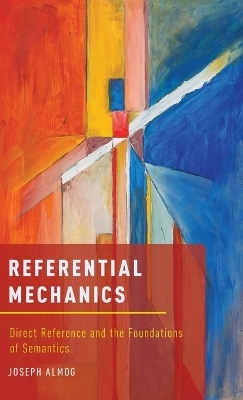
Referential Mechanics
Direct Reference and the Foundations of Semantics
Seiten
2014
Oxford University Press Inc (Verlag)
978-0-19-931437-9 (ISBN)
Oxford University Press Inc (Verlag)
978-0-19-931437-9 (ISBN)
This volume is focused on understanding a key idea in modern semantics-direct reference-and its integration into a general semantics for natural language. In the first three chapters, foundational analyses from three philosophers -Saul Kripke, David Kaplan and Keith Donnellan-are dissected in detail. The differences between their respective ideas lead to varying consequences in the philosophy of mind, the metaphysics of necessity, and the epistemological idea of a priori knowledge.
In the last chapter, two central puzzles said to threaten direct reference are raised. One is Frege's puzzle about judgments of cognitive significance and informativeness. This puzzle is analyzed and is shown to be the opposite of a threat; informative identities are, in effect, a consequence of the new cognitive insights behind direct reference. The second puzzle, the Partee-Kaplan, is a threat: how to unify the referential semantics of nouns with the seemingly non referential semantics of denoting phrases?
The volume criticizes the concept of a unifying methodology-assimilating the referential nouns to the complex denoting phrases by way of (set theoretic) "ontological sublimation "-as proposed by Montague-and launches an orthogonal unification methodology generalizing direct reference to the common nouns anchoring the denoting phrases.
In the last chapter, two central puzzles said to threaten direct reference are raised. One is Frege's puzzle about judgments of cognitive significance and informativeness. This puzzle is analyzed and is shown to be the opposite of a threat; informative identities are, in effect, a consequence of the new cognitive insights behind direct reference. The second puzzle, the Partee-Kaplan, is a threat: how to unify the referential semantics of nouns with the seemingly non referential semantics of denoting phrases?
The volume criticizes the concept of a unifying methodology-assimilating the referential nouns to the complex denoting phrases by way of (set theoretic) "ontological sublimation "-as proposed by Montague-and launches an orthogonal unification methodology generalizing direct reference to the common nouns anchoring the denoting phrases.
Joseph Almog is the author of Everything in Its Right Place (forthcoming), Cogito: Descartes and Thinking the World (2008), What Am I? Descartes and the Mind-Body Problem (2001) and co-editor of Essays on Reference, Language, and Mind (2012), Having in Mind: The Philosophy of Keith Donnellan (2012), and The Philosophy of David Kaplan (2009) - all from Oxford University Press.
Preface ; Acknowledgements ; Introduction ; Part I-Direct Reference by Designation ; Part II-Direct Reference by Singular Proposition ; Part III-Direct Reference by Referential Use ; Part IV-Foundational Questions-Two Central Puzzles ; Index
| Verlagsort | New York |
|---|---|
| Sprache | englisch |
| Maße | 211 x 142 mm |
| Gewicht | 295 g |
| Themenwelt | Geisteswissenschaften ► Philosophie ► Erkenntnistheorie / Wissenschaftstheorie |
| Geisteswissenschaften ► Philosophie ► Metaphysik / Ontologie | |
| Geisteswissenschaften ► Philosophie ► Sprachphilosophie | |
| Geisteswissenschaften ► Sprach- / Literaturwissenschaft ► Sprachwissenschaft | |
| ISBN-10 | 0-19-931437-3 / 0199314373 |
| ISBN-13 | 978-0-19-931437-9 / 9780199314379 |
| Zustand | Neuware |
| Haben Sie eine Frage zum Produkt? |
Mehr entdecken
aus dem Bereich
aus dem Bereich
die Grundlegung der modernen Philosophie
Buch | Softcover (2023)
C.H.Beck (Verlag)
18,00 €
Buch | Softcover (2023)
Reclam, Philipp (Verlag)
7,00 €

![Was heißt Denken?. Vorlesung Wintersemester 1951/52. [Was bedeutet das alles?] - Martin Heidegger](/media/113619842)
